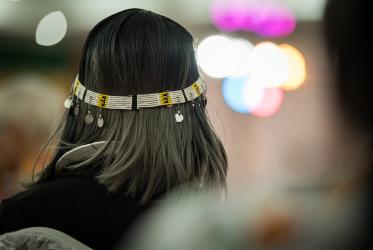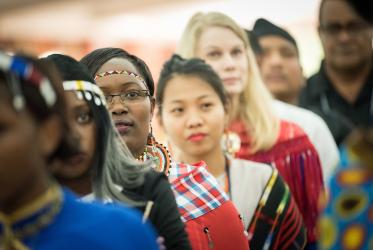By Susan Kim (*)
We are entering an era in which the public has a broader awareness of the rights of indigenous peoples, said Bishop Mark MacDonald, WCC president for North America and the National Indigenous Bishop of the Anglican Church of Canada.
“I especially see, during the past seven years, the indigenous peoples in Canada and really all the world have been moving toward self-determination and the actualization of the principal values of their elders,” he said.
What’s vital, at this point, he said, is a collective public sense that indigenous peoples must move ahead with their self-determination. “I would say that this is the most important aspect: that people will be strong in this no matter what. I think that’s really critical.”
Reflecting on his reading of Roman Catholic theologian Robert Schreiter, who has studied and advocated for reconciliation worldwide, MacDonald said reconciliation is ultimately about reclaiming indigenous identity. “Reconciliation doesn’t happen when an oppressor decides to be nice. Reconciliation begins when an oppressed people reclaim their humanity,” MacDonald said.
Climate change tied to indigenous identity
The identity of an indigenous person is often tied to the land, MacDonald continued. “In today’s world, there is an assault on the land, and on our relationship with the land and with the creatures involved. This assault is experienced in a very painful way by indigenous people.”
Many people regard with sadness the historical events during which indigenous peoples were dispossessed of their land. But climate change has resulted in a continuous, present-day dispossession of land, pointed out MacDonald. “What we see now with issues of climate injustice is an ongoing acceleration of dispossession that is threatening in so many ways to indigenous peoples — threatening to their food security and their life security. The people least responsible are most affected.”
During an Interfaith Summit on Climate Change in September 2014 in New York, 30 leaders from nine different faith traditions stood together as one, strengthening a unified call for international political leaders to respond effectively to the climate change challenge. “So many of these speakers talked about climate justice, about it being integral to the wellness of indigenous peoples. There is no good future for our planet that doesn’t involve indigenous peoples,” said MacDonald.
While MacDonald values what he terms his “western” education, the things he has learned from his elders have been invaluable in terms of his own indigenous identity. “In terms of understanding the world I live in, and who I am in that world, the elders have been most critical,” he said.
(*) Susan Kim is a freelance writer from Laurel, Maryland, United States.






